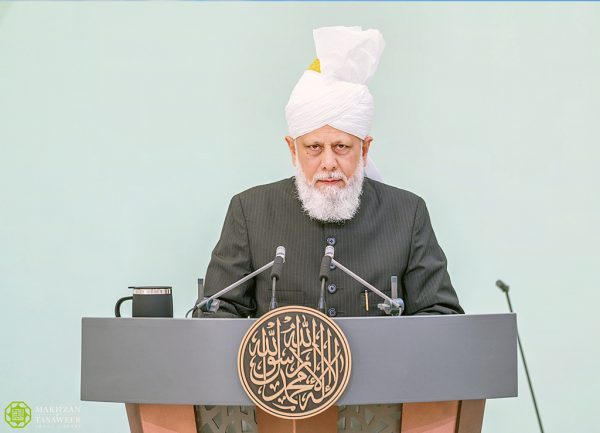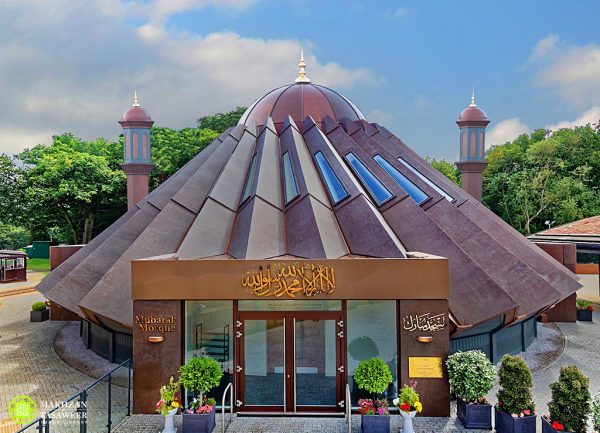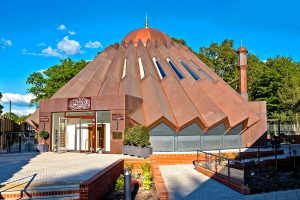After reciting Tashahhud, Ta‘awwuz and Surah al-Fatihah, His Holiness, Hazrat Mirza Masroor Ahmad (aba) said that he would continue highlighting incidents from the Battle of Uhud.

Confusion Caused to the Muslims in Battle
His Holiness (aba) said that upon the Muslims abandoning their station on the mound, the disbelievers launched a fierce attack from the rear. However even in this frantic state, the Holy Prophet (sa) maintained steadfast and patient. The Holy Prophet (sa) would call out to the companions hearkening them to return to the battlefield and fight.
His Holiness (aba) quoted Hazrat Mirza Bashir Ahmad (ra) who writes:
‘When the Companions of ‘Abdullah bin Jubair (ra) saw that victory had been secured, they said to their Amir, ‘Abdullah, “Now victory has been secured and the Muslims are collecting spoils of war. Permit us to join the army as well.” ‘Abdullah (ra) restrained them and reminded them of the strict order of the Holy Prophet (sa), but they were becoming heedless in the joy of victory, and therefore, did not abstain, and left their positions saying, “All that the Holy Prophet (sa) inferred was that the mountain pass should not be left empty until security fully prevailed, and now that victory has been clinched, there is nothing wrong with proceeding forward.” Hence, except for ‘Abdullah bin Jubair (ra) and five or seven companions, there remained no one to secure the mountain pass. When the sharp eye of Khalid bin Walid caught sight of the mountain pass from afar, he found it to be an empty field, upon which he quickly gathered his riders and immediately proceeded towards it. Behind him, Ikramah bin Abu Jahl also followed suit with whatever was left of the detachment, and quickly reached there. Both of these detachments instantly martyred ‘Abdullah bin Jubair (ra) and the few companions who stood by his side and suddenly attacked the Muslim army from the rear. Assured of their victory, the Muslims, who were unmindful and dispersed, became flustered by this sudden misfortune. Yet, despite this, they managed to regain themselves and attempted to fend off this attack by the disbelievers. At this instance, a cunning enemy called out, “O Ye Muslims! The disbelievers have launched an attack from the opposing front as well!” Taken aback, the Muslims turned upon their heels again, and in a state of confusion, without thinking, they began to swing their swords at their own men. On the other side, when Umrah bint Alqamah, a brave woman from Makkah, witnessed this sight, she immediately moved forward, and took hold of the Quraish flag, which had until now been laying in the dust, and raised it into the air. Upon witnessing this, the dismembered army of the Quraish once again regrouped, and in this manner, the Muslims became completely surrounded by the enemy from all four sides. An awful state of panic erupted within the Muslim army. The Holy Prophet (sa), who was witnessing this entire sight from an elevated location, called out to the Muslims again and again, but his voice would drown in the noise and commotion. Historians write that all this transpired in such a short period of time, that most of the Muslims even began to attack each other, and no distinction remained between friend and foe. As such, certain Muslims were wounded at the hands of other Muslims, and Yaman (ra), the father of Hudhaifah (ra), was even martyred accidentally by the Muslims. At the time, Hudhaifah (ra) was present nearby. He continued to exclaim, “O Ye Muslims! This is my father,” but at the time, who would pay heed? Afterwards, the Holy Prophet (sa) desired to pay the blood money for Yaman (ra) on behalf of the Muslims, but Hudhaifah (ra) refused to accept and said, “I forgive the Muslims for the blood of my father.”’
(Life and Character of the Seal of Prophets (sa), Vol. 2, pp. 332-334)
His Holiness (aba) quoted Hazrat Mirza Bashiruddin Mahmud Ahmad, the Second Caliph (ra), who also detailed these incidents in his commentary of Chapter 24 Verse 64 of the Holy Qur’an which states:
‘Treat not the calling of the Messenger among you like the calling of one of you to another. Allah does know those of you who steal away covertly. So let those who go against His command beware lest a trial afflict them or a grievous punishment overtake them.’
The Holy Prophet (sa) Injured in Battle
His Holiness (aba) quoted Hazrat Mirza Bashiruddin Mahmud Ahmad (ra) who explained the fact that in the fray, the Holy Prophet (sa) was struck by rocks causing the hooks of his helmet to lodge in his face, and he fell unconscious. Upon this, the false news spread among the disbelievers that, God forbid, the Holy Prophet (sa) had been martyred. All in all, the Muslims suffered great loss, and this could have been avoided had the Muslims adhered to the unequivocal instructions of the Holy Prophet (sa).
His Holiness (aba) said that the Second Caliph (ra) also detailed these incidents in his commentary of Chapter 108 of the Holy Qur’an, Al-Kauthar. It is recorded that only 12 companions remained by the Holy Prophet’s (sa) side on the mound when the disbelievers waged their attack. It was at this point that the Holy Prophet (sa) was struck with rocks causing him to lose two teeth and he also fell unconscious. As he fell, the bodies of other deceased companions also fell upon him. The false news spread amongst the disbelievers that the Holy Prophet (sa) had been martyred.
Bravery & Steadfastness of the Holy Prophet (sa)
His Holiness (aba) presented various narrations highlighting the bravery and steadfastness of the Holy Prophet (sa) during the Battle of Uhud. The Holy Prophet (sa) remained firm in battle and did not take a single step backwards, rather he stood and constantly shot arrows to the extent that his bowstring broke and had to be repaired. Then, the Holy Prophet (sa) also started throwing stones. In one narration, it is stated that the Holy Prophet (sa) was standing in the midst of the battle, and arrows were being shot towards him from all directions, yet somehow those arrows would not reach him.
His Holiness (aba) quoted the Promised Messiah (as) who highlighted the fact that the Holy Prophet (sa) did not hide the fact that he was the Messenger of Allah (sa) during the battle, thus indicating his fearlessness and bravery. The Holy Prophet (sa) was given the opportunity to stand virtually alone in battle against thousands, an opportunity for his bravery to be on full display. This sort of opportunity to exhibit such bravery was not afforded to any other prophet.
His Holiness (aba) said that his would continue highlighting these incidents in the future.

Funeral Prayers
Dr Muhammad Jalal Shams
His Holiness (aba) said that he wished to mention the good qualities of a shining servant of the Community, Dr Muhammad Jalal Shams who was serving as a missionary. His Holiness (aba) said that he led his funeral prayers yesterday, however, he wished to speak about him during the Friday Sermon as well.
His Holiness (aba) said that he was a very capable, intelligent and simple life-devotee, who recently passed away. He initially served at various places in Pakistan. Then, upon the instruction of the Third Caliph (rh), he studied the Turkish language in Islamabad. He was then sent to Turkey for higher education in the Turkish language, where he obtained his PhD in the Turkish language. Then, upon the instruction of the Fourth Caliph (rh) he served as a missionary in the UK and Germany. As such, he knew many people from Turkey, the UK and Germany, and they have been writing about him. He was later appointed as the in-charge of the Turkish Desk in the UK, in which role he served until his demise. He was blessed with great intelligence. He was even offered a job by the university in Istanbul; it was a good job with excellent compensation. When he received the offer, he sought guidance from the Fourth Caliph (rh) about what he should do. The Fourth Caliph (rh) advised that he should make a decision after prayers and careful consideration. Upon doing so, he decided to give precedence to his life-devotion and he turned down the offer. In 2002, he was imprisoned in Turkey for four months because of preaching the message of Islam Ahmadiyya. He helped translate the Holy Qur’an into Turkish, along with translating dozens of other books, including those of the Promised Messiah (as) into Turkish. He was extremely intellectual and loved to read, both literature of the Community and other literature as well. He was very humble and despite his esteemed knowledge, he was not too proud to seek help from even junior missionaries. He knew various languages. He also used to translate the Friday Sermon. Turkish natives would express how impressed they were with his mastery of the Turkish language. He had a great deal of love for the Caliphate. He would see true dreams. He would always remain occupied in the remembrance of Allah. His Holiness (aba) prayed that may Allah elevate his station, grant his wife and children patience and enable them to carry on the legacy of his virtues.
His Holiness (aba) said that he would lead the funeral prayer in absentia of the following deceased members:
Muhammad Ibrahim Bhanwri
Muhammad Ibrahim Bhanwri who recently passed away at the age of 106. Ahmadiyyat was established in his family through his father. Muhammad Ibrahim Bhanwri studied at Madrassa Ahmadiyya in Qadian, after which he studied at Jamia Ahmadiyya. He then completed his matriculation and other studies. He later dedicated his life for the sake of Islam Ahmadiyya. The Second Caliph (ra) advised him to learn office work. Thereafter he served as a professor and also served in various offices. He served as the local president of his area for over fifty years. His daughter says that the secret to his long life was waking up early for the morning prayer, remaining occupied in the remembrance of Allah, walking, cycling to school and work, a simple diet and remaining content and patient. He loved the Caliphate a great deal. His Holiness (aba) said that he also used to be his student and said that he was very loving, although he had also been strict with him at times. His Holiness (aba) said that when he was Nazir-e-A’la and would remind Muhammad Ibrahim Bhanwri of how he had been strict with him he would simply laugh. However, at the same time, he was very compassionate and his purpose would be reformation. He would advise missionaries to memorise couplets of the Promised Messiah (as) as there is guidance in them and then would give his own example of reciting the entire Arabic Qasidah written by the Promised Messiah (as) before going to sleep. One of his daughters was martyred in Pakistan, and he lost another daughter to an illness, yet he exhibited great patience. He lived a successful and long life. His Holiness (aba) prayed that may Allah elevate his station and enable his children to carry on the legacy of his virtues.
Yusuf Ijareh
Yusuf Ijareh of Ghana who recently passed away. He was a sincere Ahmadi and served the Community in various capacities. He had been serving on the chairman board of two Ahmadiyya high schools. He had also served as a headmaster. He also served as the President of the Ahmadiyya Muslim Youth Association in Ghana. He was always concerned with the education of the youth. One of his grandsons is a missionary. His Holiness (aba) prayed that may Allah grant him forgiveness and mercy.
Al Haj Usman bin Adam
Al Haj Usman bin Adam of Ghana who also recently passed away. He was a very sincere Ahmadi. He was regular in offering prayers and giving alms. He was truly devoted to the Caliphate and instilled the same passion in his children. He rendered great service in translating the Holy Qur’an into the Fanti language. He taught many people the Holy Qur’an. His Holiness (aba) prayed that may Allah grant him forgiveness and mercy and enable his children to carry on the legacy of his virtues.




Add Comment